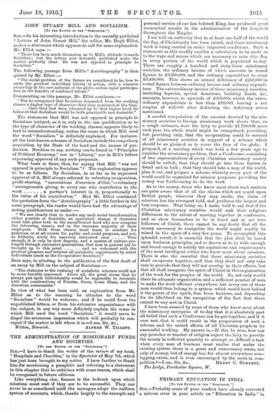JOHN STUART MILL AND SOCIALISM.
[To THE EDITOR OP THE " SescrrroR."] SIR,—In his interesting introduction to the recently published " Letters of John Stuart Mill," the editor, Mr. Hugh Elliot,
makes a statement which appears to call for some explanation. Mr. Elliot says :—
"There has been much discussion as to Mill's attitude towards Socialism; but the letters now herewith published make the matter perfectly clear. He was not opposed in principle to Socialism."
The following passage from Mill's " Autobiography " is then quoted by Mr. Elliot:— "The social problem of the future we considered to be, how to unite the greatest individual liberty of action, with a common ownership in the raw material of the globe, and an equal participa- tion in the benefits of combined labour."
Commenting on this passage, Mr. Elliot continues :—
" But he recognised that Socialism demanded from the working classes a higher type of character than they possessed at the time.
Once they had been educated up to that higher level, he believed that Socialism would be both practicable and desirable."
The statement that Mill was not opposed in principle to Socialism (subject, as it is, only to the one qualification as to the type of character of the working classes) appears likely to lead to misunderstanding, unless the sense in which Mill used
the word "Socialism" is definitely explained. For instance, all the best-known schemes of Socialism include the compulsory acquisition by the State of the land and the means of pro- duction. Needless to say, nothing can be found in "Principles of Political Economy," nor in " Liberty," nor in Mill's letters expressing approval of any such proposals.
What basis is there, then, for saying that Mill "was not opposed in principle to Socialism"? The explanation appears to be as follows. By Socialism, in so far as he expressed approval of it, Mill always referred to voluntary co-operation, profit-sharing, " associations d'ouvriers d'elite,"—voluntary "arrangements giving to every one who contributes to the work a partner's interest in it, proportionally to the value of his contribution." Had Mr. Elliot continued the quotation from the "Autobiography" a little further in the
same paragraph, the reader would have had the advantage of noting qualifications as under:— "We saw clearly that to render any such social transformation either possible or desirable, an equivalent change of character must take place both in the uncultivated herd who now comprise the labouring masses, and in the immense majority of their employers. Both these classes must learn to combine for generous, or at all events for public and social purposes, and not,
as hitherto, solely for narrowly interested ones True enough, it is only by slow degrees, and a system of culture pro- longed through successive generations, that men in general can be
brought up to this point and we welcomed with the greatest pleasure and interest all socialistic experiments by select individuals (such as the Co-operative Societies)."
Bain says, in alluding to the publication of the first draft of an essay by Mill on the subject of Socialism :-
. "The obstacles to the realising of socialistic schemes could not be more forcibly expressed. Above all, the great stress that he always put upon Individuality would be impossible to reconcile with the constructions of Fourier, Owen, Louis Blanc, and the American communists."
In view of what has been said, an explanation from Mr. Elliot as to the meaning he attaches to the word "Socialism " would be welcome; and if he could from the unpublished letters, or from his extensive acquaintance with the subject, in any way more definitely explain the sense in which Mill used the word "Socialism," it would serve to dispel the erroneous impression which will probably be con- veyed if the matter is left where it is.—I am, Sir, &c.,










































 Previous page
Previous page